◄ 1962 ►
Jan | Feb | Mar | Apr | May | Jun | Jul | Aug | Sep | Oct | Nov | Dec
| January | ► | ▲ | ||||
|---|---|---|---|---|---|---|
| 1 | 2 | 3 | 4 | 5 | 6 | |
| 7 | 8 | 9 | 10 | 11 | 12 | 13 |
| 14 | 15 | 16 | 17 | 18 | 19 | 20 |
| 21 | 22 | 23 | 24 | 25 | 26 | 27 |
| 28 | 29 | 30 | 31 | |||
![]() Jan 1: Western Samoa (now Samoa) becomes independent from New Zealand.
Jan 1: Western Samoa (now Samoa) becomes independent from New Zealand.
![]() Jan 3: A spokesman for Pope John XXIII reveals that Cuban leader Fidel Castro and several other Cuban leaders have been excommunicated.
Jan 3: A spokesman for Pope John XXIII reveals that Cuban leader Fidel Castro and several other Cuban leaders have been excommunicated.
![]()
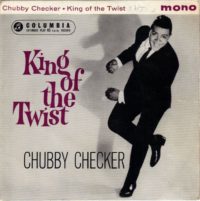 Jan 13: The Twist craze sweeps America as Chubby Checker’s single “The Twist” reaches the top of the charts. It will stay there for two weeks, only to be shoved aside by Joey Dee and the Starliters’ “Peppermint Twist”, which will also remain number one for three weeks.
Jan 13: The Twist craze sweeps America as Chubby Checker’s single “The Twist” reaches the top of the charts. It will stay there for two weeks, only to be shoved aside by Joey Dee and the Starliters’ “Peppermint Twist”, which will also remain number one for three weeks.
![]() Jan 17: Ten former game show contestants plead guilty to perjury, admitting that they had lied under oath when they said they were not given answers to questions before appearing on rigged television quiz shows. This represents the final chapter of the 1958 Quiz Show scandal that saw five popular quiz shows canceled between August and December.
Jan 17: Ten former game show contestants plead guilty to perjury, admitting that they had lied under oath when they said they were not given answers to questions before appearing on rigged television quiz shows. This represents the final chapter of the 1958 Quiz Show scandal that saw five popular quiz shows canceled between August and December.
![]() Jan 22: The Organization of American States suspends Cuba’s membership. The suspension will remain until 2009.
Jan 22: The Organization of American States suspends Cuba’s membership. The suspension will remain until 2009.
![]() Jan 30: Two of the high-wire “Flying Wallendas” are killed when their famous seven-person pyramid collapses during a performance in Detroit.
Jan 30: Two of the high-wire “Flying Wallendas” are killed when their famous seven-person pyramid collapses during a performance in Detroit.
| ◄ | February | ► | ▲ | |||
|---|---|---|---|---|---|---|
| 1 | 2 | 3 | ||||
| 4 | 5 | 6 | 7 | 8 | 9 | 10 |
| 11 | 12 | 13 | 14 | 15 | 16 | 17 |
| 18 | 19 | 20 | 21 | 22 | 23 | 24 |
| 25 | 26 | 27 | 28 | |||
![]() Feb 3: U.S. announces a comprehensive embargo of all imports from Cuba. Exports to Cuba had been embargoed in 1960.
Feb 3: U.S. announces a comprehensive embargo of all imports from Cuba. Exports to Cuba had been embargoed in 1960.
![]() Feb 4: Gnostic Philosopher Samael Aun Weor, declares February 4, 1962, to be the beginning of the “Age of Aquarius,” based on the alignment of the first six planets, the Sun, the Moon, and the constellation Aquarius. Each astrological age lasts for 2,150 years.
Feb 4: Gnostic Philosopher Samael Aun Weor, declares February 4, 1962, to be the beginning of the “Age of Aquarius,” based on the alignment of the first six planets, the Sun, the Moon, and the constellation Aquarius. Each astrological age lasts for 2,150 years.
![]()
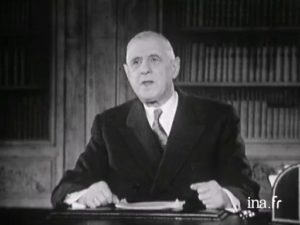 Feb 5: French President Charles de Gaulle, in a televised address, threatens to again invoke a state of emergency, which would give him near-dictatorial power to crush the outlawed Secret Army Organization (OAS), an underground far-right terrorist organization led by former French Army Officers. The OAS’s goal is to prevent Algeria from becoming independent from France. De Gaulle hints that negotiations between Paris and the provisional Algerian government are nearing a positive conclusion for possible Algerian independence. OAS saboteurs are able to knock one Algerian TV station of the air during de Gaulle’s speech. OAS attempts to destroy a microwave link and television transmitters on top of the Eiffel Tower are foiled. At the end of the broadcast speech, French Algerians turn out in the streets of Algiers, blowing whistles, banging dishpans and shouting “Algerie Francaise.” Meanwhile, it was announced that French police had arrested seven OAS leaders over the weekend, and uncovered detailed plans for assassinating police officials and prominent politicians.
Feb 5: French President Charles de Gaulle, in a televised address, threatens to again invoke a state of emergency, which would give him near-dictatorial power to crush the outlawed Secret Army Organization (OAS), an underground far-right terrorist organization led by former French Army Officers. The OAS’s goal is to prevent Algeria from becoming independent from France. De Gaulle hints that negotiations between Paris and the provisional Algerian government are nearing a positive conclusion for possible Algerian independence. OAS saboteurs are able to knock one Algerian TV station of the air during de Gaulle’s speech. OAS attempts to destroy a microwave link and television transmitters on top of the Eiffel Tower are foiled. At the end of the broadcast speech, French Algerians turn out in the streets of Algiers, blowing whistles, banging dishpans and shouting “Algerie Francaise.” Meanwhile, it was announced that French police had arrested seven OAS leaders over the weekend, and uncovered detailed plans for assassinating police officials and prominent politicians.
![]() Feb 10: Captured American U-2 pilot Francis Gary Powers is exchanged for a captured Soviet spy at the Glienicke Bridge on the border between West Berlin and East Germany.
Feb 10: Captured American U-2 pilot Francis Gary Powers is exchanged for a captured Soviet spy at the Glienicke Bridge on the border between West Berlin and East Germany.
![]() Feb 11: American politician Tammy Baldwin is born. She will become the first openly gay Representative to enter Congress, and the first openly gay U.S. Senator.
Feb 11: American politician Tammy Baldwin is born. She will become the first openly gay Representative to enter Congress, and the first openly gay U.S. Senator.
![]()
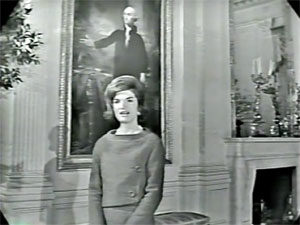 Feb 14: First Lady Jacqueline Kennedy takes television viewers on a tour of the White House. The tour is broadcast on CBS and ABC, and it will be broadcast on NBC four days later. The program is seen by 45 million viewers in the U.S., and it will be syndicated to 50 countries including Russia and China.
Feb 14: First Lady Jacqueline Kennedy takes television viewers on a tour of the White House. The tour is broadcast on CBS and ABC, and it will be broadcast on NBC four days later. The program is seen by 45 million viewers in the U.S., and it will be syndicated to 50 countries including Russia and China.
![]()
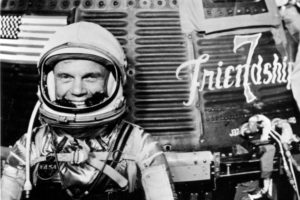 Feb 20: John Glenn becomes the first American to orbit the Earth on board Friendship 7. Glenn is launched at 9:47 a.m. local time, and enters orbit twelve minutes later. After three trips around the earth, Glenn leaves orbit at 2:20 p.m. and lands in the Atlantic Ocean 23 minutes later.
Feb 20: John Glenn becomes the first American to orbit the Earth on board Friendship 7. Glenn is launched at 9:47 a.m. local time, and enters orbit twelve minutes later. After three trips around the earth, Glenn leaves orbit at 2:20 p.m. and lands in the Atlantic Ocean 23 minutes later.
| ◄ | March | ► | ▲ | |||
|---|---|---|---|---|---|---|
| 1 | 2 | 3 | ||||
| 4 | 5 | 6 | 7 | 8 | 9 | 10 |
| 11 | 12 | 13 | 14 | 15 | 16 | 17 |
| 18 | 19 | 20 | 21 | 22 | 23 | 24 |
| 25 | 26 | 27 | 28 | 29 | 30 | 31 |
![]()
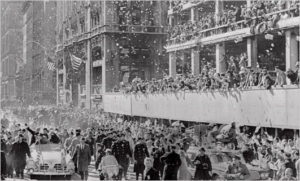 Mar 1: A massive ticker-tape parade takes place in New York City to honor astronaut John Glenn. A typical ticker-tape parade averages about 50 tons of confetti, but the city sanitation department reports that it collected 3,474 tons of paper afterward.
Mar 1: A massive ticker-tape parade takes place in New York City to honor astronaut John Glenn. A typical ticker-tape parade averages about 50 tons of confetti, but the city sanitation department reports that it collected 3,474 tons of paper afterward.
![]() Mar 2: A military coup in Burma led by Gen. Ne Win ushers in 49 years of military rule.
Mar 2: A military coup in Burma led by Gen. Ne Win ushers in 49 years of military rule.
![]()
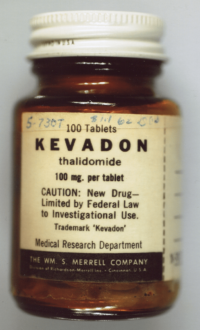 Mar 8: American drug manufacturer Richardson-Merrell Pharmaceuticals withdraws its request to the U.S. Food and Drug Administration to approve the prescription of thalidomide to pregnant mothers to ward off morning sickness. Thalidomide has been linked to 15,000 babies born with birth defects in West Germany and Australia over the previous six months. The FDA approval had been blocked by reviewer Frances Oldham Kelsey, who is hailed in the press as a hero. Her persistence leads to more rigorous drug approval regulations. Kelsey will be awarded the President’s Award for Distinguished Federal Civilian Service by President Kennedy.
Mar 8: American drug manufacturer Richardson-Merrell Pharmaceuticals withdraws its request to the U.S. Food and Drug Administration to approve the prescription of thalidomide to pregnant mothers to ward off morning sickness. Thalidomide has been linked to 15,000 babies born with birth defects in West Germany and Australia over the previous six months. The FDA approval had been blocked by reviewer Frances Oldham Kelsey, who is hailed in the press as a hero. Her persistence leads to more rigorous drug approval regulations. Kelsey will be awarded the President’s Award for Distinguished Federal Civilian Service by President Kennedy.
![]() Mar 19: After seven years of fighting between the French Army and Algerian rebels, a ceasefire is announced and set for noon local time.
Mar 19: After seven years of fighting between the French Army and Algerian rebels, a ceasefire is announced and set for noon local time.
![]() Mar 19: Bob Dylan’s self-titled debut album is released.
Mar 19: Bob Dylan’s self-titled debut album is released.
![]() Mar 20: In defiance of the cease fire declared in Algeria, OAS guerillas, made up of former French fighters opposed to Algerian independence, fire five mortar shells into a crowd of civilians at the Casbah in Algiers, killing four and wounding 67.
Mar 20: In defiance of the cease fire declared in Algeria, OAS guerillas, made up of former French fighters opposed to Algerian independence, fire five mortar shells into a crowd of civilians at the Casbah in Algiers, killing four and wounding 67.
| ◄ | April | ► | ▲ | |||
|---|---|---|---|---|---|---|
| 1 | 2 | 3 | 4 | 5 | 6 | 7 |
| 8 | 9 | 10 | 11 | 12 | 13 | 14 |
| 15 | 16 | 17 | 18 | 19 | 20 | 21 |
| 22 | 23 | 24 | 25 | 26 | 27 | 28 |
| 29 | 30 | |||||
![]() Apr 3: Jawaharial Nehru becomes Indian Prime Minister.
Apr 3: Jawaharial Nehru becomes Indian Prime Minister.
![]() Apr 3: U.S. District Judge J. Skelly Wright orders the desegregation of elementary schools in New Orleans. This order comes one week after Archbishop Joseph Rummel orders private Catholic schools integrated.
Apr 3: U.S. District Judge J. Skelly Wright orders the desegregation of elementary schools in New Orleans. This order comes one week after Archbishop Joseph Rummel orders private Catholic schools integrated.
![]() Apr 7: A Cuban military tribunal convicts the 1,179 surviving Bay of Pigs invaders of trying to overthrow the government. They are sentenced to 30 years each and fined a total of $62 million, which must be paid before they are released.
Apr 7: A Cuban military tribunal convicts the 1,179 surviving Bay of Pigs invaders of trying to overthrow the government. They are sentenced to 30 years each and fined a total of $62 million, which must be paid before they are released.
![]() Apr 8: French voters overwhelmingly approve Évian Accords, an agreement between France and Algeria’s provisional government which will lead to Algeria’s independence. Weary from eight years of war, French voters approve the measure 91% to 9%.
Apr 8: French voters overwhelmingly approve Évian Accords, an agreement between France and Algeria’s provisional government which will lead to Algeria’s independence. Weary from eight years of war, French voters approve the measure 91% to 9%.
![]() Apr 14: In a surprise move, Cuban dictator Fidel Castro releases 60 of the 1,179 Bay of Pigs invaders for health reasons, and sends them to Miami on a Pan Am flight, without conditions.
Apr 14: In a surprise move, Cuban dictator Fidel Castro releases 60 of the 1,179 Bay of Pigs invaders for health reasons, and sends them to Miami on a Pan Am flight, without conditions.
![]()
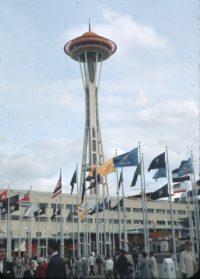 Apr 21: The Century 21 Exposition World’s Fair opens in Seattle, Washington. The fair feature’s Seattle’s iconic Space Needle, and a carnival to “fit a working man’s budget. And get this: the carnival is called “Gayway.”
Apr 21: The Century 21 Exposition World’s Fair opens in Seattle, Washington. The fair feature’s Seattle’s iconic Space Needle, and a carnival to “fit a working man’s budget. And get this: the carnival is called “Gayway.”
![]() Apr 28: Oskar Schindler, the German industrialist and Nazi Party member who saved more than 1,200 Polish Jews from extermination by the Nazis, is honored on his 54th birthday at the Yad Vashem Memorial in Jerusalem. He is proclaimed a ger toshav (“a righteous Gentile”).
Apr 28: Oskar Schindler, the German industrialist and Nazi Party member who saved more than 1,200 Polish Jews from extermination by the Nazis, is honored on his 54th birthday at the Yad Vashem Memorial in Jerusalem. He is proclaimed a ger toshav (“a righteous Gentile”).
| ◄ | May | ► | ▲ | |||
|---|---|---|---|---|---|---|
| 1 | 2 | 3 | 4 | 5 | ||
| 6 | 7 | 8 | 9 | 10 | 11 | 12 |
| 13 | 14 | 15 | 16 | 17 | 18 | 19 |
| 20 | 21 | 22 | 23 | 24 | 25 | 26 |
| 27 | 28 | 29 | 30 | 31 | ||
![]() May 5: Twelve East Germans escape via a tunnel under the Berlin Wall.
May 5: Twelve East Germans escape via a tunnel under the Berlin Wall.
![]()
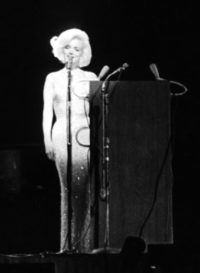 May 19: Marylin Monroe sings “Happy Birthday” to President John F. Kennedy at a Democratic Party fundraiser at Madison Square Garden. It will be Monroe’s last significant public appearance.
May 19: Marylin Monroe sings “Happy Birthday” to President John F. Kennedy at a Democratic Party fundraiser at Madison Square Garden. It will be Monroe’s last significant public appearance.
![]() May 30: Benjamin Britten’s War Requiem premieres at an the arts festival held to celebrate the consecration of the new Coventry Cathedral. The requem is scored for soprano, tenor and baritone soloists, chorus, boys’ choir, organ, and two orchestras: afull orchestra and a chamber orchestra. Critics hail it as a modern masterpiece.
May 30: Benjamin Britten’s War Requiem premieres at an the arts festival held to celebrate the consecration of the new Coventry Cathedral. The requem is scored for soprano, tenor and baritone soloists, chorus, boys’ choir, organ, and two orchestras: afull orchestra and a chamber orchestra. Critics hail it as a modern masterpiece.
![]()
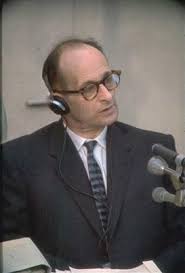 May 31: Adolf Eichmann, who was responsible for organizing and managing the logistics for the mass deportation of Jews to ghettos and concentration camps, is hanged at a prison in Ramla, Israel. His body is cremated and his ashes dumped into the Mediterranean Sea outside of Israeli territorial waters. Eichmann is the first person to be legally executed in the history of modern Israel.
May 31: Adolf Eichmann, who was responsible for organizing and managing the logistics for the mass deportation of Jews to ghettos and concentration camps, is hanged at a prison in Ramla, Israel. His body is cremated and his ashes dumped into the Mediterranean Sea outside of Israeli territorial waters. Eichmann is the first person to be legally executed in the history of modern Israel.
c
| ◄ | June | ► | ▲ | |||
|---|---|---|---|---|---|---|
| 1 | 2 | |||||
| 3 | 4 | 5 | 6 | 7 | 8 | 9 |
| 10 | 11 | 12 | 13 | 14 | 15 | 16 |
| 17 | 18 | 19 | 20 | 21 | 22 | 23 |
| 24 | 25 | 26 | 27 | 28 | 29 | 30 |
![]() Jun 2: Ray Charles’s single “I Can’t Stop Loving You” begins its five week run at the top of the charts.
Jun 2: Ray Charles’s single “I Can’t Stop Loving You” begins its five week run at the top of the charts.
![]() Jun 11: Three prisoners escape from Alcatraz Island federal penitentiary. The three — Frank Morris, John Alglin, and Clarence Anglin — are presumed drowned, although their bodies are never found.
Jun 11: Three prisoners escape from Alcatraz Island federal penitentiary. The three — Frank Morris, John Alglin, and Clarence Anglin — are presumed drowned, although their bodies are never found.
![]()
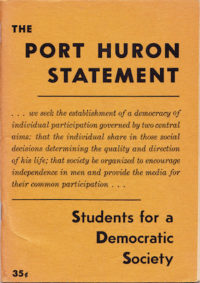 Jun 15: Students for a Democratic Society (SDS) complete the Port Huron Statement. Also known as the “Agenda for a Generation,” it popularizes the concept of participatory democracy “both as a means and an end.” The statement calls for nonviolent civil disobedience to bring about racial equality and social change, and becomes a foundational document of the New Left.
Jun 15: Students for a Democratic Society (SDS) complete the Port Huron Statement. Also known as the “Agenda for a Generation,” it popularizes the concept of participatory democracy “both as a means and an end.” The statement calls for nonviolent civil disobedience to bring about racial equality and social change, and becomes a foundational document of the New Left.
![]()
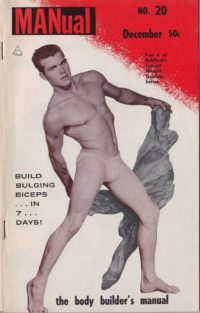 Jun 25: The U.S. Supreme Court rules that magazines featuring nude males are not obscene. In the case of MANual Enterprises v. Day, the U.S. Supreme Court rules that photos of nude men are not inherently more obscene than photos of nude women. The Court rules that the same standards applied for erotic magazines aimed at heterosexual readers must be applied to magazines aimed at homosexual readers.
Jun 25: The U.S. Supreme Court rules that magazines featuring nude males are not obscene. In the case of MANual Enterprises v. Day, the U.S. Supreme Court rules that photos of nude men are not inherently more obscene than photos of nude women. The Court rules that the same standards applied for erotic magazines aimed at heterosexual readers must be applied to magazines aimed at homosexual readers.
![]() Jun 25: The U.S. Supreme Court rules in Engle v. Vitale that mandatory prayers in public schools are unconstitutional.
Jun 25: The U.S. Supreme Court rules in Engle v. Vitale that mandatory prayers in public schools are unconstitutional.
| ◄ | July | ► | ▲ | |||
|---|---|---|---|---|---|---|
| 1 | 2 | 3 | 4 | 5 | 6 | 7 |
| 8 | 9 | 10 | 11 | 12 | 13 | 14 |
| 15 | 16 | 17 | 18 | 19 | 20 | 21 |
| 22 | 23 | 24 | 25 | 26 | 27 | 28 |
| 29 | 30 | 31 | ||||
![]() Jul 1: Rwanda and Burundi, formerly the northern and southern parts of the Belgian colony of Ruanda-Urundi, are both granted independence from Belgium.
Jul 1: Rwanda and Burundi, formerly the northern and southern parts of the Belgian colony of Ruanda-Urundi, are both granted independence from Belgium.
![]() Jul 1: Following the French referendum on Algerian independence held on April 8, Algerians voters go to the polls and, in a nearly unanimous vote, approve the Evian Accords. The vote was 5,992,115 for independence, and only 16,532 against. Most of the 1.4 million or so French nationals living in Algeria have either fled or abstained.
Jul 1: Following the French referendum on Algerian independence held on April 8, Algerians voters go to the polls and, in a nearly unanimous vote, approve the Evian Accords. The vote was 5,992,115 for independence, and only 16,532 against. Most of the 1.4 million or so French nationals living in Algeria have either fled or abstained.
![]() Jul 5: Algerian becomes independent from France.
Jul 5: Algerian becomes independent from France.
![]()
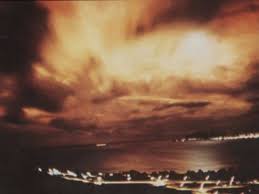 Jul 9: The U.S. explodes a 1.4 megaton hydrogen bomb in outer space, 248 miles above Johnston Atoll in the Pacific. The detonation reveals the destructive power of the electromagnetic pulse, which disrupts electric power and communications systems 900 miles away in Hawaii. The explosion also pumps enough radiation into the Van Allen belts to destroy or damage seven satellites.
Jul 9: The U.S. explodes a 1.4 megaton hydrogen bomb in outer space, 248 miles above Johnston Atoll in the Pacific. The detonation reveals the destructive power of the electromagnetic pulse, which disrupts electric power and communications systems 900 miles away in Hawaii. The explosion also pumps enough radiation into the Van Allen belts to destroy or damage seven satellites.
![]() Jul 9: Andy Warhol premieres his Campbell’s Soup Cans exhibit in Los Angeles.
Jul 9: Andy Warhol premieres his Campbell’s Soup Cans exhibit in Los Angeles.
![]()
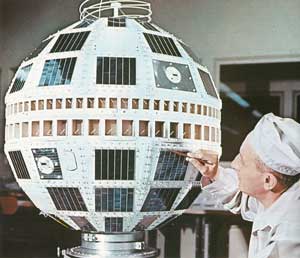 Jul 10: Telstar 1, the first privately financed communications satellite, is launched from Cape Canaveral.
Jul 10: Telstar 1, the first privately financed communications satellite, is launched from Cape Canaveral.
![]() Jul 14: Bobby Vinton’s single “Roses Are Red” begins its four week run at the top of the charts.
Jul 14: Bobby Vinton’s single “Roses Are Red” begins its four week run at the top of the charts.
![]() Jul 17: The last atmospheric nuclear test at the Nevada test site is conducted with the detonation of an M-388 tactical nuclear projectile. It is the smallest nuclear weapon system ever built.
Jul 17: The last atmospheric nuclear test at the Nevada test site is conducted with the detonation of an M-388 tactical nuclear projectile. It is the smallest nuclear weapon system ever built.
![]()
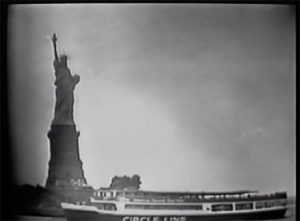 Jul 23: Telstar 1 relays the first live trans-Atlantic television broadcast via satellite. Because the satellite is not in geosynchronous orbit, it can only relay transmissions to and from Europe during a 20-minute interval while it is over the Atlantic ocean. Two separate 20-minute broadcasts are conducted. The first, from America, opens with the Statute of Liberty, and includes a couple of plays of a baseball game, President Kennedy’s news conference, and scenes from San Francisco, a Detroit expressway, Niagara Falls (via Canada), hula dancers, the United Nations, a fairground and Mt. Rushmore. When Telstar’s orbit brings it again over the Atlantic a few hours later, the European broadcast begins with the image of Big Ben filling the screen. That second broadcast also features the Champs-Élysées, the Roman Coliseum, the National Museum in Belgrade, the Sistine Chapel, an operatic performance in progress in Rome, a farm in Sweden near the Arctic Circle, and fishermen in Sicily. The broadcasts are shown on all three American networks, the CBC, and the Eurovision-member networks.
Jul 23: Telstar 1 relays the first live trans-Atlantic television broadcast via satellite. Because the satellite is not in geosynchronous orbit, it can only relay transmissions to and from Europe during a 20-minute interval while it is over the Atlantic ocean. Two separate 20-minute broadcasts are conducted. The first, from America, opens with the Statute of Liberty, and includes a couple of plays of a baseball game, President Kennedy’s news conference, and scenes from San Francisco, a Detroit expressway, Niagara Falls (via Canada), hula dancers, the United Nations, a fairground and Mt. Rushmore. When Telstar’s orbit brings it again over the Atlantic a few hours later, the European broadcast begins with the image of Big Ben filling the screen. That second broadcast also features the Champs-Élysées, the Roman Coliseum, the National Museum in Belgrade, the Sistine Chapel, an operatic performance in progress in Rome, a farm in Sweden near the Arctic Circle, and fishermen in Sicily. The broadcasts are shown on all three American networks, the CBC, and the Eurovision-member networks.
| ◄ | August | ► | ▲ | |||
|---|---|---|---|---|---|---|
| 1 | 2 | 3 | 4 | |||
| 5 | 6 | 7 | 8 | 9 | 10 | 11 |
| 12 | 13 | 14 | 15 | 16 | 17 | 18 |
| 19 | 20 | 21 | 22 | 23 | 24 | 25 |
| 25 | 27 | 28 | 29 | 30 | 31 | |
![]()
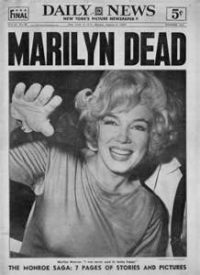 Aug 5: Marilyn Monroe is found dead from an overdose in her Brentwood, Los Angeles home.
Aug 5: Marilyn Monroe is found dead from an overdose in her Brentwood, Los Angeles home.
![]() Aug 5: Nelson Mandela is arrested in South Africa after returning from a tour of African nations. He is charged with incitement to rebellion and leaving the country without permission.
Aug 5: Nelson Mandela is arrested in South Africa after returning from a tour of African nations. He is charged with incitement to rebellion and leaving the country without permission.
![]() Aug 6: Jamaica becomes independent from Britain.
Aug 6: Jamaica becomes independent from Britain.
![]() Aug 11: The Soviets launch Vostok 3, carrying Andriyan Nikolayev into earth orbit.
Aug 11: The Soviets launch Vostok 3, carrying Andriyan Nikolayev into earth orbit.
![]()
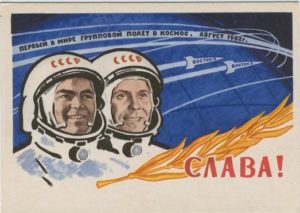 Aug 12: The Soviets launch Vostok 4, with cosmonaut Pavel Popovich on board. On only the fourth launch of a cosmonaut into space, this marks the first time that two manned spacecraft are in orbit at the same time. The launch of Vistok 4 is carefully timed to allow the two Vostok capsules will come to within 4 miles of each other, a remarkable feat of coordination.
Aug 12: The Soviets launch Vostok 4, with cosmonaut Pavel Popovich on board. On only the fourth launch of a cosmonaut into space, this marks the first time that two manned spacecraft are in orbit at the same time. The launch of Vistok 4 is carefully timed to allow the two Vostok capsules will come to within 4 miles of each other, a remarkable feat of coordination.
![]() Aug 15: Vostok 3 lands safely after establishing a new record of 64 orbits and nearly four days in space. Vostok 4 returns the same day after completing 48 orbits.
Aug 15: Vostok 3 lands safely after establishing a new record of 64 orbits and nearly four days in space. Vostok 4 returns the same day after completing 48 orbits.
![]()
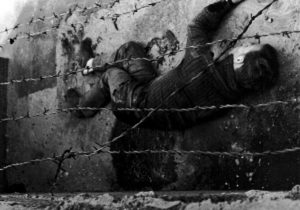 Aug 17: East German border guards kill 18-year-old Peter Fechter as he tries to cross the Berlin Wall into West Berlin. Fechter’s death is particularly notorious when he slowly bleeds to death in full view of news photographers and hundreds of spectators, while East German guards refuse to approach him.
Aug 17: East German border guards kill 18-year-old Peter Fechter as he tries to cross the Berlin Wall into West Berlin. Fechter’s death is particularly notorious when he slowly bleeds to death in full view of news photographers and hundreds of spectators, while East German guards refuse to approach him.
![]() Aug 31: Trinidad and Tobago become independent from Britain.
Aug 31: Trinidad and Tobago become independent from Britain.
| ◄ | September | ► | ▲ | |||
|---|---|---|---|---|---|---|
| 1 | ||||||
| 2 | 3 | 4 | 5 | 6 | 7 | 8 |
| 9 | 10 | 11 | 12 | 13 | 14 | 15 |
| 16 | 17 | 18 | 19 | 20 | 21 | 22 |
| 23 | 24 | 25 | 26 | 27 | 28 | 29 |
| 30 | ||||||
![]() Sep 2: The Soviet Union announces that it has signed an agreement with Cuba on military and industrial assistance. This announcement comes six weeks before the October Cuban Missile Crisis becomes public knowledge.
Sep 2: The Soviet Union announces that it has signed an agreement with Cuba on military and industrial assistance. This announcement comes six weeks before the October Cuban Missile Crisis becomes public knowledge.
![]() Sep 10: The U.S. Supreme Court orders the University of Mississippi to enroll James Meredith as the first African-American student at the all-white university.
Sep 10: The U.S. Supreme Court orders the University of Mississippi to enroll James Meredith as the first African-American student at the all-white university.
![]() Sep 11: Five weeks before the October Cuban Missile Crisis becomes public knowledge, the Soviet Union warns that a U.S. attack on Cuba or on Soviet ships carrying supplies to Cuba “will be the beginning of unleashing war … which might plunge the world into the disaster universal world war with the use of thermonuclear weapons.”
Sep 11: Five weeks before the October Cuban Missile Crisis becomes public knowledge, the Soviet Union warns that a U.S. attack on Cuba or on Soviet ships carrying supplies to Cuba “will be the beginning of unleashing war … which might plunge the world into the disaster universal world war with the use of thermonuclear weapons.”
![]() Sep 11: American actress Kristy McNichol is born.
Sep 11: American actress Kristy McNichol is born.
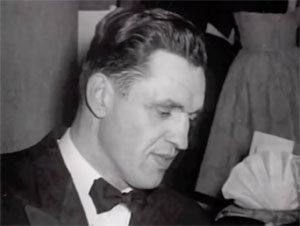 Sep 12: British Admiralty clerk John Vassall is arrested for spying. His opulent apartment and high-flying lifestyle drew no suspicion, despite his humble £908 a year salary. It should have, because when he is arrested and charged with spying for the Soviet Union, British investigators discover that he had been spying since 1954 when the Soviets blackmailed him with photos of him with other men in compromising positions. Vassall’s arrest re-ignites the debate over criminalizing homosexuality between men, with critics pointing out that gay men will always be vulnerable to blackmail and extortion as long as the threat of imprisonment hangs over their heads.
Sep 12: British Admiralty clerk John Vassall is arrested for spying. His opulent apartment and high-flying lifestyle drew no suspicion, despite his humble £908 a year salary. It should have, because when he is arrested and charged with spying for the Soviet Union, British investigators discover that he had been spying since 1954 when the Soviets blackmailed him with photos of him with other men in compromising positions. Vassall’s arrest re-ignites the debate over criminalizing homosexuality between men, with critics pointing out that gay men will always be vulnerable to blackmail and extortion as long as the threat of imprisonment hangs over their heads.![]() Sep 13: Mississippi Gov. Ross Barnett delivers a twenty-minute televised address instructing state officials to refuse to obey a federal court order to integrate the University of Mississippi. He declares, “We will not drink from the cup of genocide. There is no case in history where the Caucasian race has survived integration. … There is no cause which is more moral and just than the protection of the integrity of our races.”
Sep 13: Mississippi Gov. Ross Barnett delivers a twenty-minute televised address instructing state officials to refuse to obey a federal court order to integrate the University of Mississippi. He declares, “We will not drink from the cup of genocide. There is no case in history where the Caucasian race has survived integration. … There is no cause which is more moral and just than the protection of the integrity of our races.”
![]() Sep 15: The Four Seasons’ single “Sherry” begins its five week run at the top of the charts.
Sep 15: The Four Seasons’ single “Sherry” begins its five week run at the top of the charts.
![]() Sep 18: U.S. Marine Corps helicopters fly a combat mission in South Vietnam for the first time. The Marines ferry South Vietnamese troops from Da Nang to the hills to the south of the city.
Sep 18: U.S. Marine Corps helicopters fly a combat mission in South Vietnam for the first time. The Marines ferry South Vietnamese troops from Da Nang to the hills to the south of the city.
![]() Sep 20: James Meridith arrives at Oxford, Mississippi, escorted by federal marshals, to enroll at the University of Mississippi. Gov. Ros Barnett personally blocks Meredith’s from entering the admissions building.
Sep 20: James Meridith arrives at Oxford, Mississippi, escorted by federal marshals, to enroll at the University of Mississippi. Gov. Ros Barnett personally blocks Meredith’s from entering the admissions building.
![]() Sep 22: Bob Dylan’s “A Hard Rain’s Gonna Fall” premieres in the U.S. at a concert at Carnegie Hall.
Sep 22: Bob Dylan’s “A Hard Rain’s Gonna Fall” premieres in the U.S. at a concert at Carnegie Hall.
![]()
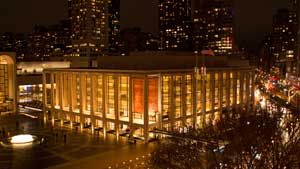 Sep 23: Philharmonic Hall, the first of three buildings for the Lincoln Center for the Performing Arts, opens in New York City. The inaugural concert features Leanard Bernstine and the New York Philharmonic Orchestra, and several opera stars. The concert is broadcast live on CBS. The hall will be renamed Avery Fisher Hall in 1973, and David Geffen Hall in 2015.
Sep 23: Philharmonic Hall, the first of three buildings for the Lincoln Center for the Performing Arts, opens in New York City. The inaugural concert features Leanard Bernstine and the New York Philharmonic Orchestra, and several opera stars. The concert is broadcast live on CBS. The hall will be renamed Avery Fisher Hall in 1973, and David Geffen Hall in 2015.
![]()
 Sep 23: The prime-time animated sitcom The Jetsons, premieres on ABC. It debuts as that network’s first program broadcast in color.
Sep 23: The prime-time animated sitcom The Jetsons, premieres on ABC. It debuts as that network’s first program broadcast in color.
![]() Sep 26: The Beverly Hillbillies premieres on CBS.
Sep 26: The Beverly Hillbillies premieres on CBS.
![]() Sep 29: President Kennedy issues a proclamation commanding all those who have prevented James Meredith from enrolling at the University of Mississippi, in violation of court orders, to “cease and desist therefrom and to disperse and retire peaceably forthwith.” The proclamation also cites the President’s authority to call out the armed forces “to suppress any insurrection, domestic violence, unlawful combination, or conspiracy.”
Sep 29: President Kennedy issues a proclamation commanding all those who have prevented James Meredith from enrolling at the University of Mississippi, in violation of court orders, to “cease and desist therefrom and to disperse and retire peaceably forthwith.” The proclamation also cites the President’s authority to call out the armed forces “to suppress any insurrection, domestic violence, unlawful combination, or conspiracy.”
![]() Sep 29: Mississippi Gov. Ross Barnett attends a Saturday night Ole Miss game against Kentucky. During halftime, as a giant Confederate flag is displayed on the field, he gives a brief speech: “I love Mississippi! I love her people! Our customs! I love and respect her heritage!”
Sep 29: Mississippi Gov. Ross Barnett attends a Saturday night Ole Miss game against Kentucky. During halftime, as a giant Confederate flag is displayed on the field, he gives a brief speech: “I love Mississippi! I love her people! Our customs! I love and respect her heritage!”
![]()
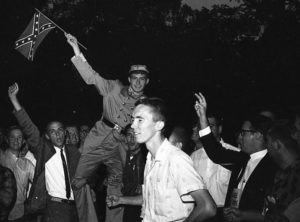 Sep 30: James Meredith, escorted by U.S. Marshalls, arrives at Oxford, Mississippi and moves into a dorm room before enrolling the next day at the University of Mississippi. That evening, a riot breaks out in Oxford after state police are withdrawn from the city. The Mississippi National Guard is federalized and sent to Oxford to restore order.
Sep 30: James Meredith, escorted by U.S. Marshalls, arrives at Oxford, Mississippi and moves into a dorm room before enrolling the next day at the University of Mississippi. That evening, a riot breaks out in Oxford after state police are withdrawn from the city. The Mississippi National Guard is federalized and sent to Oxford to restore order.
| ◄ | October | ► | ▲ | |||
|---|---|---|---|---|---|---|
| 1 | 2 | 3 | 4 | 5 | 6 | |
| 7 | 8 | 9 | 10 | 11 | 12 | 13 |
| 14 | 15 | 16 | 17 | 18 | 19 | 20 |
| 21 | 22 | 23 | 24 | 25 | 26 | 27 |
| 28 | 29 | 30 | 31 | |||
![]()
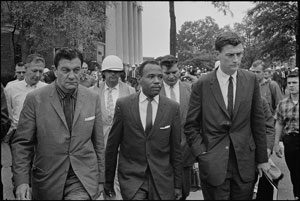 Oct 1: James Meredith becomes the first black student to enroll at the University of Mississippi. He attends his first class, in American History.
Oct 1: James Meredith becomes the first black student to enroll at the University of Mississippi. He attends his first class, in American History.
![]() Oct 1: Johnny Carson takes over as the permanent host of NBC’s The Tonight Show.
Oct 1: Johnny Carson takes over as the permanent host of NBC’s The Tonight Show.
![]() Oct 1: The Lucy Show premieres on CBS.
Oct 1: The Lucy Show premieres on CBS.
![]()
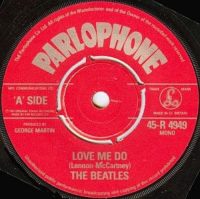 Oct 5: The Beatles’ first single, “Love Me Do”/”P.S. I Love You” is released in the U.K.
Oct 5: The Beatles’ first single, “Love Me Do”/”P.S. I Love You” is released in the U.K.
![]() Oct 5: The first James Bond film, Dr. No, premieres in London.
Oct 5: The first James Bond film, Dr. No, premieres in London.
![]() Oct 9: Uganda becomes independent from the British.
Oct 9: Uganda becomes independent from the British.
![]() Oct 10: War breaks out between China and India, the world’s two most populous countries, over a long-simmering border dispute.
Oct 10: War breaks out between China and India, the world’s two most populous countries, over a long-simmering border dispute.
![]()
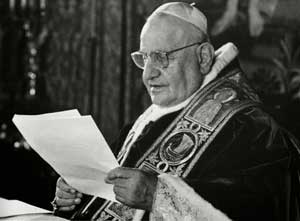 Oct 11: Pope John XXIII convenes the first session of the Second Vatican Council.
Oct 11: Pope John XXIII convenes the first session of the Second Vatican Council.
![]() Oct 13: Edward Albee’s Who’s Afraid of Virginia Woolf? premieres on Broadway.
Oct 13: Edward Albee’s Who’s Afraid of Virginia Woolf? premieres on Broadway.
![]() Oct 20: In the Sino-Indian War, 30,000 Chinese troops halt and overrun an Indian invasion into disputed territory.
Oct 20: In the Sino-Indian War, 30,000 Chinese troops halt and overrun an Indian invasion into disputed territory.
![]()
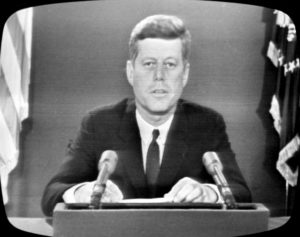 Oct 22: In a nationally televised address, President John F. Kennedy reveals the existence of Soviet missiles in Cuba. He announces “a strict quarantine on offensive military equipment under shipment to Cuba.” He also warns that any launch of a nuclear missile from Cuba on any nation in the western hemisphere will require “a full retaliatory response upon the Soviet Union.” Kennedy adds, “I call upon Chairman Khrushchev to halt and eliminate this clandestine, reckless and provocative threat to world peace and to stable relations between our nations.” The U.S. military forces go to DEFCON 3.
Oct 22: In a nationally televised address, President John F. Kennedy reveals the existence of Soviet missiles in Cuba. He announces “a strict quarantine on offensive military equipment under shipment to Cuba.” He also warns that any launch of a nuclear missile from Cuba on any nation in the western hemisphere will require “a full retaliatory response upon the Soviet Union.” Kennedy adds, “I call upon Chairman Khrushchev to halt and eliminate this clandestine, reckless and provocative threat to world peace and to stable relations between our nations.” The U.S. military forces go to DEFCON 3.
![]() Oct 23: Four hundred and fifty ships of the U.S. Atlantic Fleet and 200,000 military personnel are assembled and begin preparations for a confrontation with Soviet ships as the freighter Polotavia sails toward the quarantine line.
Oct 23: Four hundred and fifty ships of the U.S. Atlantic Fleet and 200,000 military personnel are assembled and begin preparations for a confrontation with Soviet ships as the freighter Polotavia sails toward the quarantine line.
![]()
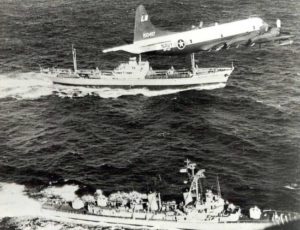 Oct 24: The U.S. Navy quarantine of Soviet ships begin. Some Soviet freighters alter their courses while others proceed. The U.S. raises its readiness level of Strategic Air Command forces to DEFCON 2 while the rest of the armed forces remain at DEFCON 3. This places B-52 bombers on continuous airborne alert, B47 bombers fully loaded and ready to take off on 15 minutes notice, 145 ICBMs on ready alert, and one-third of 161 nuclear-armed intercepters on 15-minute alert. Twenty-four Air Force Reserve squadrons are activated.
Oct 24: The U.S. Navy quarantine of Soviet ships begin. Some Soviet freighters alter their courses while others proceed. The U.S. raises its readiness level of Strategic Air Command forces to DEFCON 2 while the rest of the armed forces remain at DEFCON 3. This places B-52 bombers on continuous airborne alert, B47 bombers fully loaded and ready to take off on 15 minutes notice, 145 ICBMs on ready alert, and one-third of 161 nuclear-armed intercepters on 15-minute alert. Twenty-four Air Force Reserve squadrons are activated.
![]()
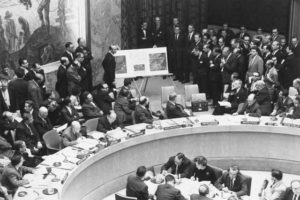 Oct 25: Two American destroyers stop and board a Soviet-chartered freighter 400 miles from Cuba. The Navy allows the ship to proceed after a two-hour search of its cargo shows that it poses no threat. Meanwhile, American U.N. Ambassador Adlai Stevenson angrily confronts Soviet Valerian Zorin with photos of the Soviet missile sites in Cuba. Zorin refuses to answer Stevenson’s questions.
Oct 25: Two American destroyers stop and board a Soviet-chartered freighter 400 miles from Cuba. The Navy allows the ship to proceed after a two-hour search of its cargo shows that it poses no threat. Meanwhile, American U.N. Ambassador Adlai Stevenson angrily confronts Soviet Valerian Zorin with photos of the Soviet missile sites in Cuba. Zorin refuses to answer Stevenson’s questions.
![]()
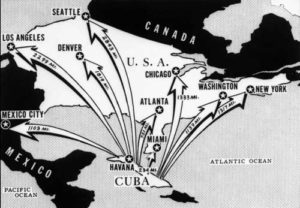 Oct 26: The Soviets agree to keep their ships away from the quarantine line “for the time being.” But American officials counter that the real threat is in the construction work already underway in Cuba. The latest U-2 overflights show that the Soviets are accelerating their construction of missile bases in Cuba in order to “achieve a full operational capability as soon as possible.”
Oct 26: The Soviets agree to keep their ships away from the quarantine line “for the time being.” But American officials counter that the real threat is in the construction work already underway in Cuba. The latest U-2 overflights show that the Soviets are accelerating their construction of missile bases in Cuba in order to “achieve a full operational capability as soon as possible.”
![]() Oct 26: India proclaims its first ever state of emergency as Chinese troops continue their invasion. The state of emergency will last until January 10, 1968.
Oct 26: India proclaims its first ever state of emergency as Chinese troops continue their invasion. The state of emergency will last until January 10, 1968.
![]()
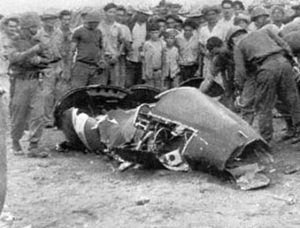 Oct 27: An American U-2 is shot down over Cuba, killing pilot Maj. Rudolf Anderson. Several other American reconnaissance aircraft are fired on. The Navy drops a series of depth charges on a nuclear-equipped Soviet sub as it approaches the quarantine line. Another U-2 strays into Soviet airspace near Alaska and is nearly intercepted by Soviet fighters. With so many potential flashpoints occurring in very quick succession, war appears all but imminent.
Oct 27: An American U-2 is shot down over Cuba, killing pilot Maj. Rudolf Anderson. Several other American reconnaissance aircraft are fired on. The Navy drops a series of depth charges on a nuclear-equipped Soviet sub as it approaches the quarantine line. Another U-2 strays into Soviet airspace near Alaska and is nearly intercepted by Soviet fighters. With so many potential flashpoints occurring in very quick succession, war appears all but imminent.
![]() Oct 28: The Cuban Missile Crisis ends when Soviet leader Nikita Khrushchev announces that he has ordered the removal of Soviet missile bases in Cuba. The U.S. pledges not to invade Cuba. The U.S. also privately pledges to remove obsolete American missiles from Turkey at a later date. The U.S. will continue enforcing its quarantine until the Soviet missiles and bombers are removed from Cuba.
Oct 28: The Cuban Missile Crisis ends when Soviet leader Nikita Khrushchev announces that he has ordered the removal of Soviet missile bases in Cuba. The U.S. pledges not to invade Cuba. The U.S. also privately pledges to remove obsolete American missiles from Turkey at a later date. The U.S. will continue enforcing its quarantine until the Soviet missiles and bombers are removed from Cuba.
![]() Oct 31: The cult classic Whatever Happened to Baby Jane?, starring Bette Davis and Joan Crawford, is released.
Oct 31: The cult classic Whatever Happened to Baby Jane?, starring Bette Davis and Joan Crawford, is released.
| ◄ | November | ► | ▲ | |||
|---|---|---|---|---|---|---|
| 1 | 2 | 3 | ||||
| 4 | 5 | 6 | 7 | 8 | 9 | 10 |
| 11 | 12 | 13 | 14 | 15 | 16 | 17 |
| 18 | 19 | 20 | 21 | 22 | 23 | 24 |
| 25 | 26 | 27 | 28 | 29 | 30 | |
![]() Nov 2: The U.S. and Soviet Union reach a final agreement on the removal of Soviet nuclear missiles from Cuba. President John F. Kennedy announces the plan in a nationally-televised address.
Nov 2: The U.S. and Soviet Union reach a final agreement on the removal of Soviet nuclear missiles from Cuba. President John F. Kennedy announces the plan in a nationally-televised address.
![]() Nov 3: The United States conducts its last atmospheric nuclear test with another high altitude detonation 13 miles above Johnston Atoll.
Nov 3: The United States conducts its last atmospheric nuclear test with another high altitude detonation 13 miles above Johnston Atoll.
![]()
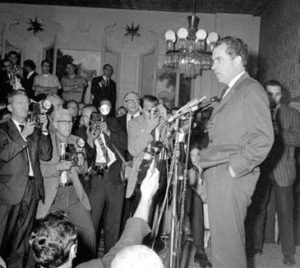 Nov 6: Richard M. Nixon loses the California governor’s race. The next day, he will hold what he calls his “last press conference” where he will announce his retirement from politics. He tells reporters, “you won’t have Nixon to kick around anymore.”
Nov 6: Richard M. Nixon loses the California governor’s race. The next day, he will hold what he calls his “last press conference” where he will announce his retirement from politics. He tells reporters, “you won’t have Nixon to kick around anymore.”
![]() Nov 7: Nelson Mandela is sentenced to five years in prison for incitement to rebellion and leaving the country without permission. While in prison, he will be charged with other crimes that will lead to a life sentence.
Nov 7: Nelson Mandela is sentenced to five years in prison for incitement to rebellion and leaving the country without permission. While in prison, he will be charged with other crimes that will lead to a life sentence.
![]() Nov 7: Former First Lady Eleanor Roosevelt dies at the age of 78.
Nov 7: Former First Lady Eleanor Roosevelt dies at the age of 78.
![]() Nov 15: Strategic Air Command returns to DEFCON 3 as tensions continue to ease over the Cuban Missile Crisis.
Nov 15: Strategic Air Command returns to DEFCON 3 as tensions continue to ease over the Cuban Missile Crisis.
![]() Nov 17: The Four Seasons’ single “Big Girls Don’t Cry” begins its five week run at the top of the charts.
Nov 17: The Four Seasons’ single “Big Girls Don’t Cry” begins its five week run at the top of the charts.
![]() Nov 18: After a three-week pause in the Sino-Indian war during which China to reinforces and resupplies its troops, China launches a larger invasion and overruns Indian positions in Assam.
Nov 18: After a three-week pause in the Sino-Indian war during which China to reinforces and resupplies its troops, China launches a larger invasion and overruns Indian positions in Assam.
![]() Nov 19: Actress Jody Foster is born.
Nov 19: Actress Jody Foster is born.
![]() Nov 20: After the Soviet Union removes its missiles from Cuba, President John F. Kennedy formally ends the blockade.
Nov 20: After the Soviet Union removes its missiles from Cuba, President John F. Kennedy formally ends the blockade.
![]() Nov 20: China unilaterally announces a cease-fire with India and says its troops will withdraw to the “line of actual control” that it had observed three years earlier.
Nov 20: China unilaterally announces a cease-fire with India and says its troops will withdraw to the “line of actual control” that it had observed three years earlier.
![]()
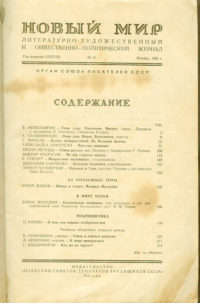 Nov 21: Aleksandr Solzhenitsyn’s novella One Day in the Life of Ivan Denisovich is published in the literary magazine Novy Mir. The novella, which required clearance from Soviet leader Nikita Khrushchev himself to be published, represents an unprecedented acknowledgement of the Soviet Union’s Stalinist past.
Nov 21: Aleksandr Solzhenitsyn’s novella One Day in the Life of Ivan Denisovich is published in the literary magazine Novy Mir. The novella, which required clearance from Soviet leader Nikita Khrushchev himself to be published, represents an unprecedented acknowledgement of the Soviet Union’s Stalinist past.
![]() Nov 25: The satire That Was The Week That Was premieres on BBC.
Nov 25: The satire That Was The Week That Was premieres on BBC.
![]() Nov 28: The U.S. Armed Forces lowers its defense readiness condition back to DEFCON 4.
Nov 28: The U.S. Armed Forces lowers its defense readiness condition back to DEFCON 4.
| ◄ | December | ▲ | ||||
|---|---|---|---|---|---|---|
| 1 | ||||||
| 2 | 3 | 4 | 5 | 6 | 7 | 8 |
| 9 | 10 | 11 | 12 | 13 | 14 | 15 |
| 16 | 17 | 18 | 19 | 20 | 21 | 22 |
| 23 | 24 | 25 | 26 | 27 | 28 | 29 |
| 30 | 31 | |||||
![]()
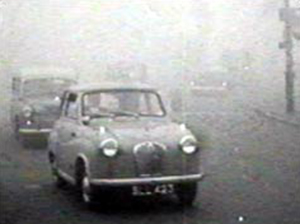 Dec 2-6: A week of severe smog begins in London. Over the next four days, it will kill at least 106 people and send another thousand to the hospital. During the height of the smog, visibility is as low as 15 feet. By December 5, the smog will spread across Britain, with Leeds recording its highest ever level of sulphur dioxide in the air and pneumonia cases in Glasgow have trebling. Extremely low visibility combines with ice-covered roads to make road travel especially difficult. This will be London’s last great smog event before clean air legislation takes effect in 1965.
Dec 2-6: A week of severe smog begins in London. Over the next four days, it will kill at least 106 people and send another thousand to the hospital. During the height of the smog, visibility is as low as 15 feet. By December 5, the smog will spread across Britain, with Leeds recording its highest ever level of sulphur dioxide in the air and pneumonia cases in Glasgow have trebling. Extremely low visibility combines with ice-covered roads to make road travel especially difficult. This will be London’s last great smog event before clean air legislation takes effect in 1965.
![]() Dec 6: Thirty-seven coal miners are killed at U.S. Steel-owned mine near Carmichaels, Pennsylvania.
Dec 6: Thirty-seven coal miners are killed at U.S. Steel-owned mine near Carmichaels, Pennsylvania.
![]()
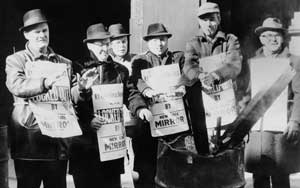 Dec 8: The New York City newspaper strike begins, affecting all seven of the city’s major newspapers. It will last for 114 days.
Dec 8: The New York City newspaper strike begins, affecting all seven of the city’s major newspapers. It will last for 114 days.
![]() Dec 10: The epic film Lawrence of Arabia premieres in London at a private showing for Queen Elizabeth II and invited guests.
Dec 10: The epic film Lawrence of Arabia premieres in London at a private showing for Queen Elizabeth II and invited guests.
![]() Dec 23-24: The 1,119 remaining prisoners captured by Cuba during the Bay of Pigs invasion are released from prison and repatriated to the United State in exchange for $53 million in food aid.
Dec 23-24: The 1,119 remaining prisoners captured by Cuba during the Bay of Pigs invasion are released from prison and repatriated to the United State in exchange for $53 million in food aid.
![]() Dec 25: The film To Kill a Mockingbird premieres in Los Angeles.
Dec 25: The film To Kill a Mockingbird premieres in Los Angeles.
![[Emphasis Mine]](http://jimburroway.com/wp-content/uploads/2018/01/KissInProtestToronto.jpg)